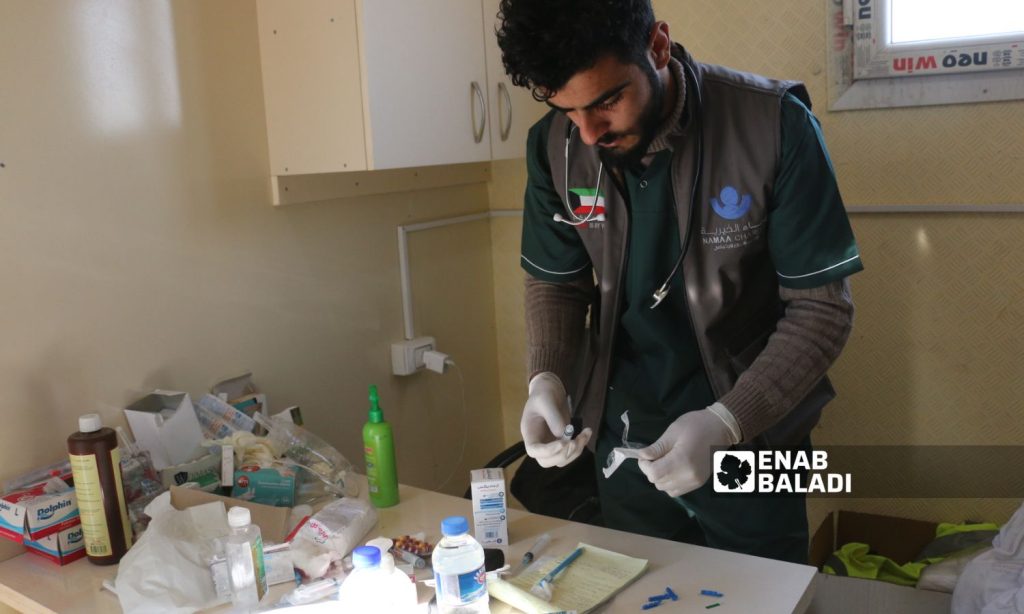Enab Baladi – Aleppo countryside
An hour after the earthquake occurred on February 6, the young Ibrahim Khaled al-Hamam crawled out from under the rubble following the collapse of his house in the town of Jindires in the northern countryside of Aleppo.
Despite the transfer of the young man, 26, to the hospital and treatment in an emergency manner, he cannot walk on his feet more than 14 days after the earthquake that struck southern Turkey and four Syrian provinces, leaving more than 50,000 dead, including 6,000 in Syria.
Al-Hamam suffers from crush syndrome, fractures in both feet, and numerous bruises, due to the collapse of a concrete wall on them after a failed attempt to escape from the house where he has been living for three years.
The IDP of the western countryside of Aleppo is currently living in a tent with his relatives near the town, which was the most affected area in northern Syria.
Hundreds of families in the town of Jindires are still in need of shelter and medical treatment, despite the work of dozens of organizations and associations that provide tents and aid and the existence of shelters.
For his part, Abdul-Rahman Allawi, 25, suffers from bone fragmentation in his foot, which was injured while he was trying to get his sisters out of the family home in the town.
Allawi told Enab Baladi that his sister was also injured, as she suffers from pain in her shoulder, as well as his wife, who was hit in the head.
With tears pouring down and in a choked voice, Allawi’s mother could not continue her conversation in a tent sheltering four families near the town of Jindires.
The mother complained to Enab Baladi about her poor condition, and she also appealed for medical support for her son and daughter.
Hussein, another quake affected, with his wife and three children, escaped from under the rubble five minutes after the earthquake occurred, with the help of one of their neighbors, indicating that he was taking his last breaths as the cement concrete was crouching on his head and chest.
Hussein told Enab Baladi that his wife had a broken nose and that his children had some bruises, describing their situation as “homeless,” as they are currently living in a tent for their relatives, and they still need medical care.
International organizations are absent
The situation of Ibrahim, Hussein, Abdul-Rahman, and his sister is similar to the hundreds of cases that still need support and assistance following the earthquake that resulted in 2,274 deaths and 12,400 injuries in northwestern Syria.
Mahmoud Haffar, head of the local council in Jindires, told Enab Baladi that the number of buildings that collapsed in the town as a result of the earthquake is more than 270 buildings that have completely collapsed, and more than 1,000 buildings are cracked and uninhabitable.
Haffar added that the earthquake affected 7,000 families, at least 4,000 of whom were directly affected, and the other families left because their homes were no longer habitable.
Jindires’ local council head stated that the number of deaths counted by the council after the formation of a relief, medical and statistical team exceeded 1,100 cases, the severe injuries were more than 850, and the moderate and light injuries were more than 4,000.
He added that more than 60% of those affected sleep in tents or shelters, and the people are still in urgent need of shelter and sustainable aid over an average period of about six months.
According to the head of the local council in Jindires, most of the efforts are local efforts with support from most regions of the north, with no real effective impact of international organizations capable of changing the situation left by the earthquake so far.
The local council in Jindires previously published a statement of the needs of the people on February 19, stating that the affected people need to secure food and relief materials and support to the drinking water stations in the town and its countryside with fuel to operate them.
The town also needs to restore 21 partially damaged schools, provide baby food and milk, what mothers need to care for their children and repair water tanks and damaged mosques.
Aid continues to enter the stricken town, as well as volunteer and medical teams continue to provide their services in the shelters where the affected people have taken refuge, but they remain temporary in view of the scale of the disaster.
Enab Baladi’s correspondent in Aleppo countryside, Dayan Junpaz, contributed to this report.











